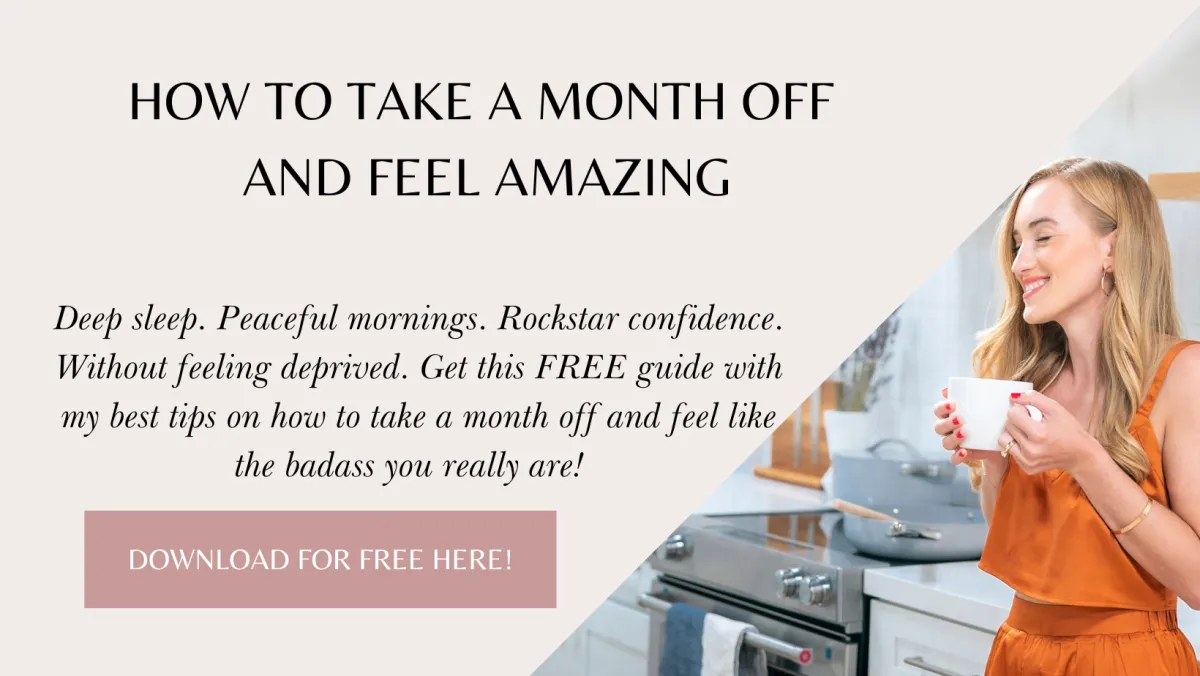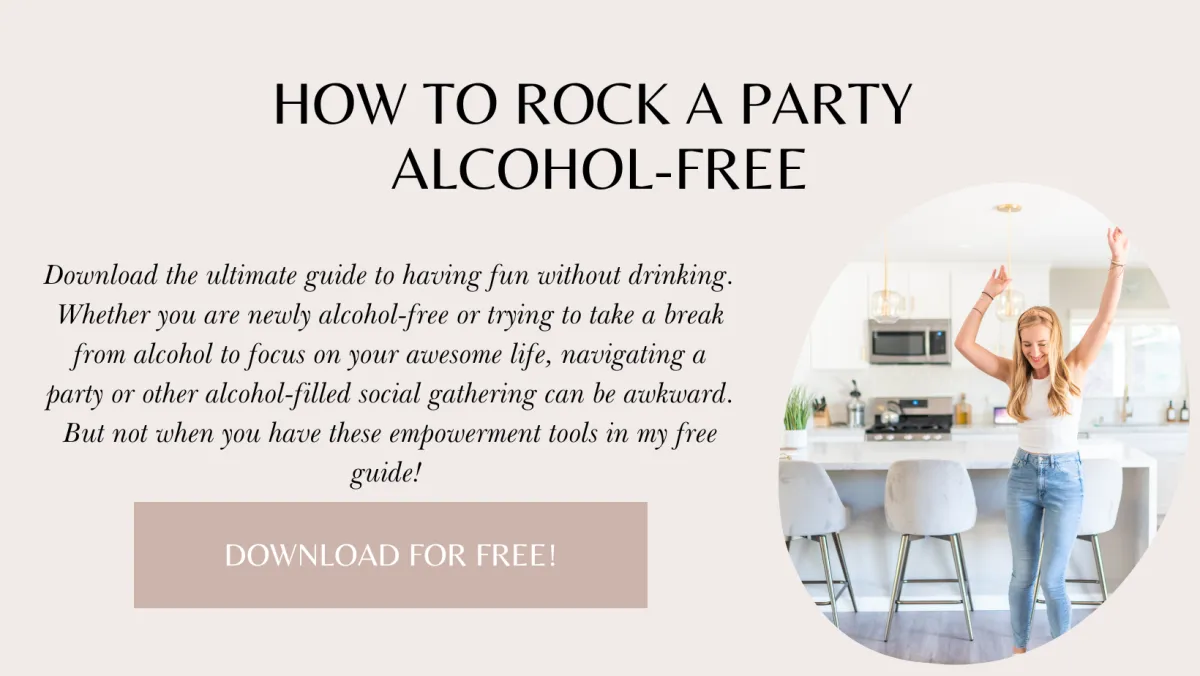12 Common Mistakes People Make When Ditching Alcohol

I’ve been an alcohol-free life coach for a few years now and have talked to hundreds of women (and some amazing men) about embarking on the alcohol-free lifestyle. There is no greater endeavor in life. You get connected with your fears and your greater why. You learn how to be your authentic self.
But this endeavor also has a lot of misinformation and old school mental models that can sometimes hurt more than they help. Sobriety doesn’t have to be an endless slog, life of deprivation, or struggle you have to overcome.
Here are some common mistakes that prevent true FREEDOM.
1. Thinking That You’re Powerless
Alcohol slows down your prefrontal cortex, or the very part of your brain that is responsible for decision making and judgment. Saying you’re powerless over a beverage that is scientifically meant to distort your brain is kind of an oxymoron. If you pass out after being injected with horse tranquilizer, does that make you powerless over that too? And since alcohol’s very effect on your brain makes your brain want more alcohol, that too is but the scientific effect of the drug. Deciding that you will no longer let a beverage distort your beautiful brain is in fact the greatest power move you could make. You are powerful!
2. Depriving Yourself
This isn’t about what you give up, or the lifestyle of lack. You gain so much! Including a world exploding with new alcohol-free drinks every single month. There are HUNDREDS of complex and fun drinks out there that don’t have ethanol in them. Seriously, the alcohol-free industry is forecasted to boom so much, even alcohol companies are investing. Consumers are demanding it! Heck, even Coca Cola has a line called Bar None with Spiced Ginger Mules and Dry Aged Ciders.
Not only are there zillions of tried and true flavors, this is the industry that allows for huge creativity for what constitutes a drink. Kin Euphorics even has a line of drinks with nootropics, or non-psychosomatic brain enhancers like ginseng. There are botanical blends like Seedlip or Borrago to make a perfect tonic or gimlet. There’s coffee cream stout. There’s sparkling rosé. And if that hits too close to home for you, there are a ton of drinks like Spindrift or sparkling coconut water with yuzu. I mean, the options are endless.
So if you’re not drinking something you love that’s alcohol-free, WHY THE HELL NOT?? When you feel deprived all the time, you’re not living sustainably.
Find some of your new favorites online at Nano Bar.
3. Making a Vague Goal
Unbeknownst to you, “quitting drinking” is actually a really vague goal. When are you successful? When you die? When do you get to celebrate it? Forever is probably the scariest word to the human brain and actually stops so many people from even getting started. You wake up on Monday with a hangover and vow you won’t drink anymore. Come Friday, you’re like, ok, that was crazy talk, I’ll start next week.
When you commit to a break, it takes the pressure off and leaves you with no excuses to just go for it already! When I start working with clients we decide on an attainable goal. And then we celebrate the heck out of it when they reach it. Sixty days is an amazing timeframe, but 30 is great too. (And if you’re making all these excuses all the time, how about just 7?). When reach your goal, you make a new one!
4. Thinking There’s Something Wrong With You
Having a complicated relationship with alcohol is actually the most typical type of relationship with alcohol you could possibly have. Studies from the Substance Abuse and Mental Health Administration have found that 60 percent of drinkers misuse alcohol. And most of that percentage isn’t heavily addicted. It’s called the new normal. Overdrinking is how we’re conditioned to drink. No one bats an eye at unlimited champagne brunch. Or a day of beer tasting.
Now, talking about having a stressful relationship with alcohol? That’s where we all have felt alone, because it’s not ever discussed in our society! So that leads you to believe that there must be something wrong with YOU. Nothing could be further from the truth. Your brain is doing exactly what it should with a substance like alcohol.
5. Not Understanding the Science Behind Alcohol
There is nothing wrong with you. There is something wrong with the drink. Alcohol triggers the pleasure center in your brain and tells you, more please! It forms a habit loop and very strong neural pathways that get deeper and deeper over time and with more exposure. It’s inevitable. (But all reversible—thank you neuroplasticity!).
When you don’t understand the science behind alcohol, you assume all the problems with the drink are because of you. Did you know alcohol heightens your anxiety? Makes you on edge with fight or flight hormones racing through your body for days after drinking? Disrupts your sleep cycles and lowers your REM sleep?
Knowledge is power and leaves you knowing deep down, it wasn’t me. It was the alcohol.

6. Not Questioning Societal Conditioning
This complicated relationship you might have with alcohol also isn’t your fault. I mean, isn’t it actually really crazy that we’ve all been pushed to drink since we were teenagers? What’s the likelihood that someone wouldn’t become a drinker in our society? They would have to skip teenage drinking and peer pressure. Skip college drinking and the false independence that comes with that. Skip happy hours with their colleagues in their new career. Skip ever having wine to chillax once they have kids.
Why is alcohol used in every celebration, social event, and even commiseration? You could say to yourself, oh well, that’s all normal and I’m just a loner who can’t hang. Or you can see a much bigger picture—a flawed reality. A human construct. And an alcohol industry that makes billions off of our insecurities.
7. Not Introspecting Into the Root Causes
The science behind alcohol explains why it forms such a strong emotional dependency for many people. But every emotional dependency is different. We each uniquely attach our own relevance to alcohol and why we believe it brings us benefits.
For example, as an introverted shy teen, alcohol was this magical elixir that turned me into a gregarious life-of-the-party extrovert. I carried that meaning that I associated with alcohol, that it turned me into a different person, through my entire drinking career. It also points out some deep insecurities I had. I didn’t believe I was fun enough, interesting enough, or good enough as I was on my own without a chemical substance. Wooooof. I had to work through those things! We all carry meaning and relevance around alcohol. What’s yours?
8. Changing Your Habit Without Changing Your Mindset
Not drinking is an incredible feat! But I have worked with so many clients who’ve taken a break before for lent or dry January and didn’t find their desires for alcohol any less sedated. That’s because just not drinking leaves a vacuum and does little to change your mindset. You need to learn to think like a non-drinker and seriously question all the mental models you’ve had up until this point that lead you to want to drink. Don’t worry, I have a plan for you.
9. Saying I Can’t Instead of I Don’t
There’s a lot of things I don’t do, and trust me, I am better for them! I don’t smoke cigarettes, or do drugs. I don’t do road rage. I don’t cheat on my husband or pay my taxes late.
I’m not limited by what I can’t do. I am FREER for what I don’t do. Do you see the difference there? It’s a matter of identity and pride. What would it take for you to feel proud that you don’t drink? Instead of embarrassed? How could you start to see it as upleveling your life?
10. Doing It Alone
Immersing yourself around people who are also upleveling their life will change yours. You start to aspire to what they have, both with going for an alcohol-free life and some major life goals. Facebook and Instagram are a haven for groups and like-minded soul-seekers as is Meetup.com for meetups in real life.
In addition to surrounding yourself with uplevelers, you may consider working with a coach or joining a program that helps you change your mindset around drinking. It will literally change your life.
11. Not Making the Incentive Big Enough
Behavior change experts agree that you have to be incentivized to make big changes in your life, otherwise, why not just fall back into what’s easy and your comfort zone? One of the best ways to do this is to invest in yourself (instead of the alcohol industry) and put some skin in the game. It hasn’t always been easy, but investing in myself has been the cornerstone of making huge shifts and game-changing breakthroughs in my life. There’s a difference between people who dabble and people who go all in.
You also need to attach a deeper why into your reason for changing. What do you risk losing out on if you don’t make this change?
12. Not Removing Subconscious Desires
While you consciously are aware that you want to drink less or not at all, you’re up against a hidden iceberg of subconscious desires and motives that you don’t know about! It’s why willpower or white-knuckling it just doesn’t work. You have to change your brain and your thinking and there’s a very unique process to do this. Want to learn how?
If you're ready to affirm your new alcohol-free identity and go after your biggest dreams, let's talk about how VIP coaching can get you there. Book a free discovery session here.
Make your desires for alcohol disappear when you read my book Euphoric: Ditch Alcohol and Gain a Happier, More Confident You. Click here to get your copy.





